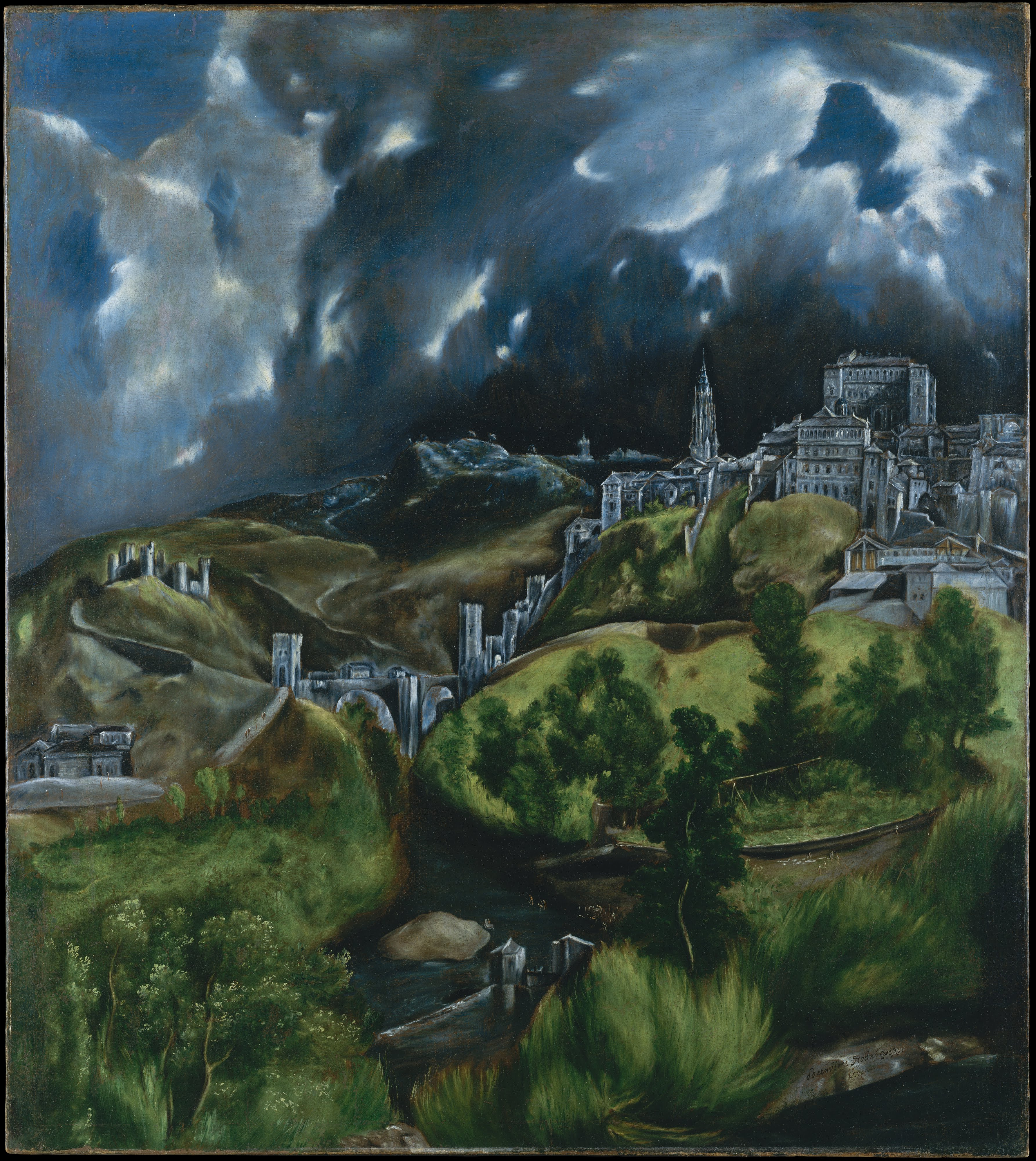
-El Greco’s landscape of Toledo, Spain (ca 1596) depicts the priory in which John was held captive, just below the old Muslim alcázar and perched on the banks of the Tajo on high cliffs
One of the Great Catholic Reformers, Saint John of the Cross (San Juan de la Cruz) (b: 24 June 1542 — d: 14 December 1591), born Juan de Yepes Alvarez of a Jewish converso family, was a major figure of the Catholic Reformation, a Spanish mystic, and Carmelite friar and priest, born at Hontoveros, Old Castile.
John learned the importance of self-sacrificing love from his parents. His father gave up wealth, status, and comfort when he married a weaver’s daughter and was disowned by his noble family. After his father died, his mother kept the destitute family together as they wandered homeless in search of work. These were the examples of sacrifice that John followed with his own great love of God.
John was a reformer and re-vitalizer of the Carmelite Order and is considered, along with Saint Teresa of Ávila, as a founder of the Discalced Carmelites. He is also known for his writings. Both his poetry and his studies on the growth of the soul are considered the summit of mystical Spanish literature and one of the peaks of all Spanish literature.
Ordained a Carmelite priest at 25 (1567), John met Teresa of Jesus (Avila–October 15) and like her vowed himself to the primitive Rule of the Carmelites. As partner with Teresa and in his own right, John engaged in the work of reform, and came to experience the price of reform: increasing opposition, misunderstanding, persecution, imprisonment.
Yet, the paradox! In this dying of imprisonment, John came to life, uttering poetry. In the darkness of the dungeon, John’s spirit came into The Light, paper he used to write on passed to him by one of his guards.
There are many mystics, many poets; John is unique as mystic-poet, expressing in his prison-cross the ecstasy of mystical union with God in the “Spiritual Canticle”.
But as agony leads to ecstasy, so John had his “Ascent to Mt. Carmel”, as he named it in his prose masterpiece. Thomas Merton said of John: “Just as we can never separate asceticism from mysticism, so in St. John of the Cross we find darkness and light, suffering and joy, sacrifice and love united together so closely that they seem at times to be identified together and inseparable.”
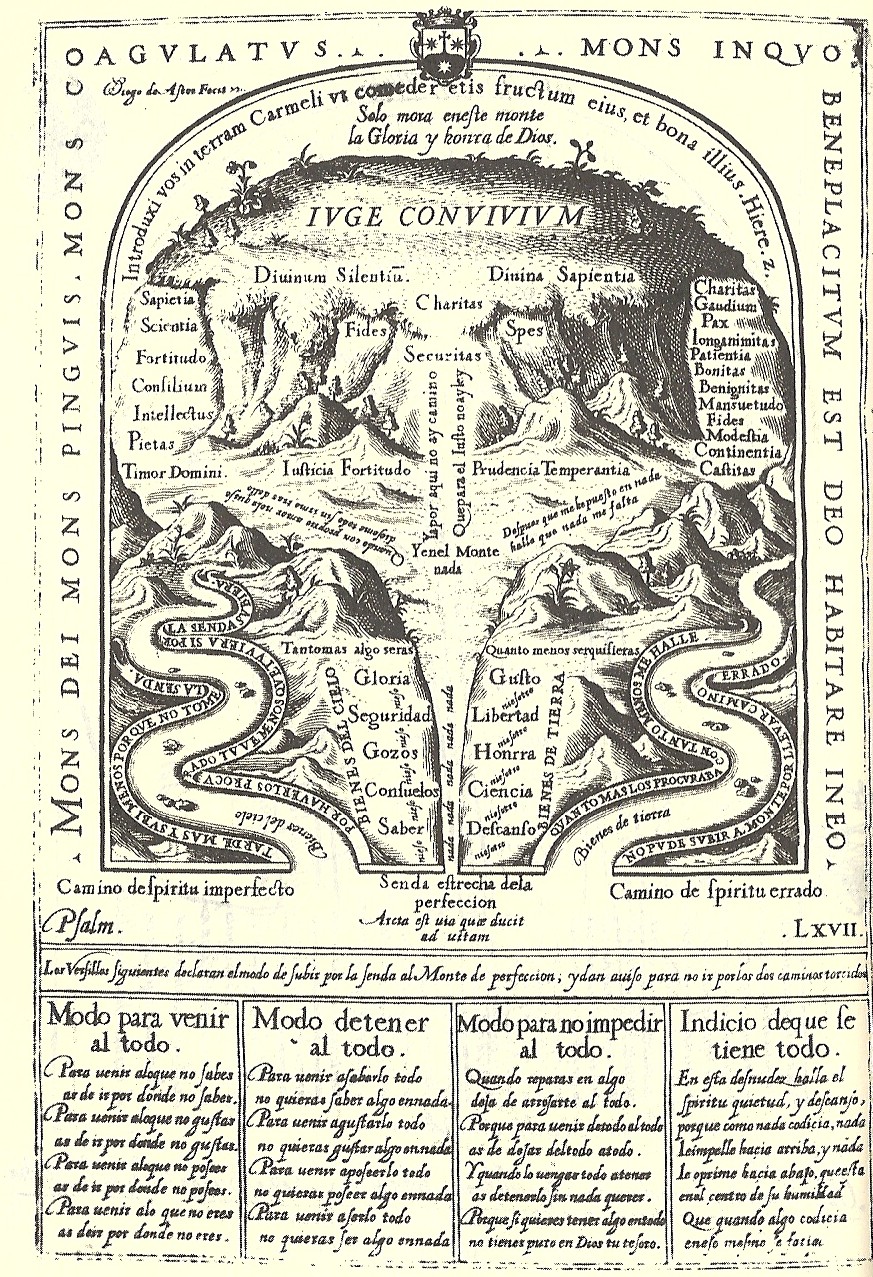
-“The Ascent of Mount Carmel”, as depicted in the first edition of 1618 by Diego de Astor
“First, have habitual desire to imitate Christ in all your deeds by bringing your life into conformity with His. You must then study His life in order to know how to imitate Him and behave in events as He would.”
—St. John of the Cross, The Ascent of Mount Carmel
“To love is to labor to divest and deprive oneself for God of all that is not God. When this is done, the soul will be illumined by and transformed in God.”
—St. John of the Cross, The Ascent of Mount Carmel
The Church of England commemorates him, too, as a “Teacher of the Faith” on this same day.
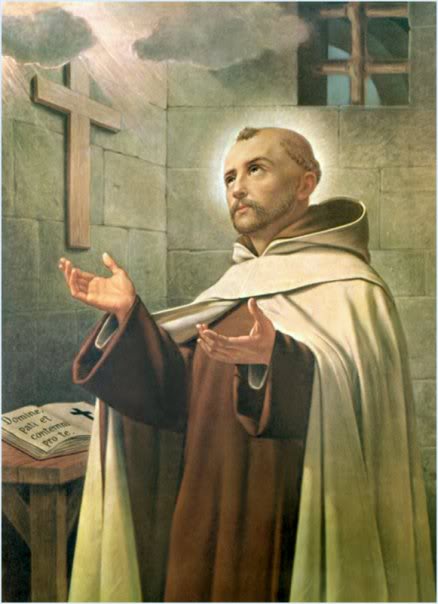
-In the iconography of St John of the Cross, you can see the words written in the book, which was St John of the Cross’ motto: “Domine, pati et contemni pro te!” “Lord, to suffer and be despised for You!”
“Live in the world as if only God and your soul were in it; then your heart will never be made captive by any earthly thing.” -St. John of the Cross
“The Lord measures out perfection neither by the multitude of our deeds, but by the manner in which we perform them.” -St. John of the Cross
“Strive thus to desire to enter into complete detachment and emptiness and poverty, with respect to everything that is in the world, for Christ’s sake.”
-St. John of the Cross
“To saints, their very slumber is a prayer.” -St. John of the Cross
“Contemplation is nothing else than a secret, peaceful, and loving infusion of God, which if admitted, will set the soul on fire with the Spirit of love.”
-St. John of the Cross
“Where there is no love, put love and you will find love.”
–St. John of the Cross
“Love consists not in feeling great things but in having great detachment and in suffering for the Beloved.”
-St. John of the Cross
“There is another reason also why the soul has traveled safely in this; it has suffered: for the way of suffering is safer, and also more profitable, than that of rejoicing and of action. In suffering God gives strength, but in action and in joy the soul does but show its own weakness and imperfections. And in suffering, the soul practices and acquires virtue, and becomes pure, wiser, and more cautious.”
—St. John of the Cross, Dark Night of the Soul
“Never give up prayer, and should you find dryness and difficulty, persevere in it for this very reason. God often desires to see what love your soul has, and love is not tried by ease and satisfaction.”
–St. John of the Cross
“I would, then, that I could convince spiritual persons that this road to God consists not in a multiplicity of meditations nor in ways or methods of such, nor in consolations, although these things may in their own way be necessary to beginners; but that it consists only in the one thing that is needful, which is the ability to deny oneself truly, according to that which is without and to that which is within, giving oneself up to suffering for Christ’s sake . . . For progress comes not save through the imitation of Christ, Who is the Way, the Truth and the Life, and no man comes to the Father but by Him.”
—St. John of the Cross, Ascent of Mount Carmel
“In the first place it should be known that if a person is seeking God, his Beloved is seeking him much more.” -St. John of the Cross
“In tribulation immediately draw near to God with confidence, and you will receive strength, enlightenment, and instruction.”
–St. John of the Cross
“The soul that walks in love neither tires others nor grows tired.”
-St. John of the Cross
“They who are bent on sensible sweetness, labor also under another very great imperfection: excessive weakness and remissness on the rugged road of the cross; for the soul that is given to sweetness naturally sets its face against all the pain of self-denial. They labor under many other imperfections, which have their origin here, of which our Lord will heal them in due time, through temptations, aridities and trials, elements of the dark night.”
— St. John of the Cross
“Live in faith and hope, though it be in darkness, for in this darkness God protects the soul. Cast your care upon God for you are His and He will not forget you. Do not think that He is leaving you alone, for that would be to wrong Him.”
-St. John of the Cross
Prayer of Peace
“O Blessed Jesus, grant me stillness of soul in Thee. Let Thy mighty calmness reign in me. Rule me, O thou King of gentleness, King of peace. Give me control, control over my words, thoughts and actions. From all irritability, want of meekness, want of gentleness, O dear Lord, deliver me. By thine own deep patience give me patience, stillness of soul in Thee. Make me in this, and in all, more and more like Thee. Amen.”-St John of the Cross
“Let Your divinity shine on my intellect by giving it divine knowledge, and on my will by imparting to it the divine love and on my memory with the divine possession of glory.
Let us so act that by means of this loving activity we may attain to the vision of ourselves in Your beauty in eternal life. That is: That I be so transformed in Your beauty that we may be alike in beauty, and both behold ourselves in Your beauty, possessing now Your very beauty; this, in such a way that each looking at the other may see in the other his own beauty, since both are Your beauty alone, I being absorbed in Your beauty; hence, I shall see You in Your beauty, and You shall see me in Your beauty, and I shall see myself in You in Your beauty, and You will see Yourself in me in Your beauty; that I may resemble You in Your beauty, and You resemble me in Your beauty, and my beauty will be Your beauty and Your beauty my beauty; wherefore I shall be You in Your beauty, and You will be me in Your beauty, because Your very beauty will be my beauty; and therefore we shall behold each other in Your beauty.
O abyss of delights! You are so much the more abundant the more Your riches are concentrated in the infinite unity and simplicity of Your unique being, where one attribute is so known and enjoyed as not to hinder the perfect knowledge and enjoyment of the other; rather, each grace and virtue within You is a light for each of Your other grandeurs. By Your purity, O divine Wisdom, many things are behold in You through one. For You are the deposit of the Father’s treasures, the splendor of the eternal light, the unspotted mirror and image of His goodness.
Awaken and enlighten us, my Lord, that we might know and love the blessings which You ever propose to us, and that we might understand that You have moved to bestow favors on us and have remembered us.
O Lord, my God, who will seek You with simple and pure love and not find You are all he desires, for You show Yourself first and go out to meet those who desire You?
My spirit has become dry because it forgets to feed on You.”
Prayer of a Soul Taken with Love
“Lord God, my Beloved, if You remember still my sins in suchwise that You do not do what I beg of You, do Your will concerning them, my God, which is what I most desire, and exercise Your goodness and mercy, and You will be known through them. And if it is that You are waiting for my good works so as to hear my prayer through their means, grant them to me, and work them for me, and the sufferings You desire to accept, and let it be done. But if You are not waiting for my works, what is it that makes You wait, my most clement Lord? Why do You delay? For if, after all, I am to receive the grace and mercy which I entreat of You in Your Son, take my mite, since You desire it, and grant me this blessing, since You also desire that. Who can free himself from the lowly manners and limitations if You do not lift him to Yourself, my God, in purity of love? How will a man begotten and nurtured in lowliness rise up to You, Lord, if You do not raise him with Your hand which made him? You will not take from me, my God, what You once gave me in Your only Son, Jesus Christ in Whom You gave me all I desire. Hence I rejoice that if I wait for You, You will not delay. With what procrastinations do You wait, since from this very moment you can love God in your heart? Mine are the heavens and mine is the earth. Mine are the nations, the just are mine, and mine the sinners. The angels are mine, and the Mother of God, and all things are mine; and God Himself is mine and for me, because Christ is mine and all for me.What do you ask, then, and seek, my soul? Yours is all of this, and all is for you. Do not engage yourself in something less, nor pay heed to the crumbs which fall from your Father’s table. Go forth and exult in your Glory! Hide yourself in It and rejoice, and you will obtain the supplications of your heart.
Oh, how sweet Your presence will be to me, You Who are the supreme good! I must draw near You in silence pleased to unite me to You in … I rejoice in Your arms. Now I ask You, Lord, do not abandon me at any time in my recollection, for I know not the value of my soul.”
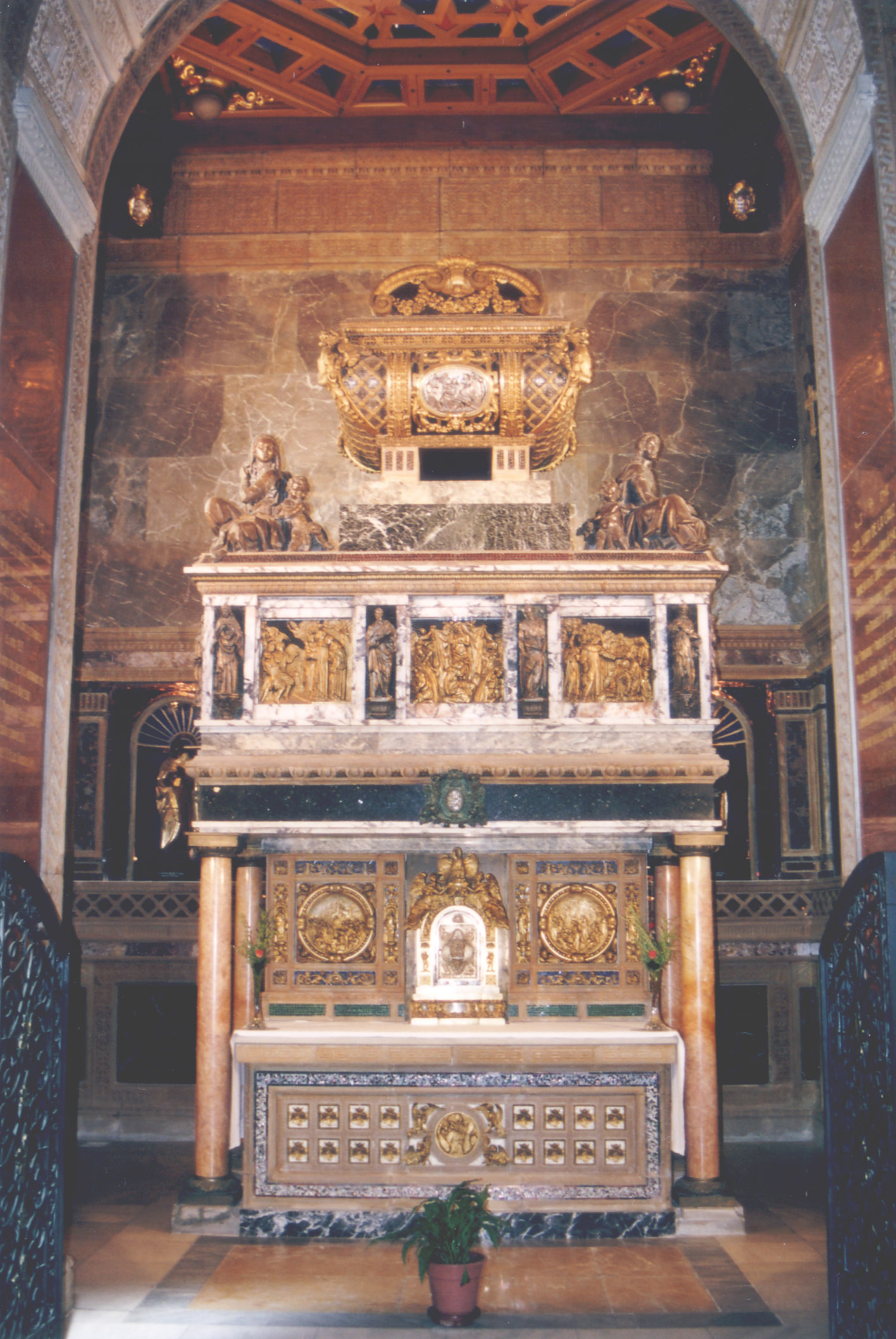
-reliquary of St John of the Cross, Convent of Carmelite Friars, Segovia, Spain
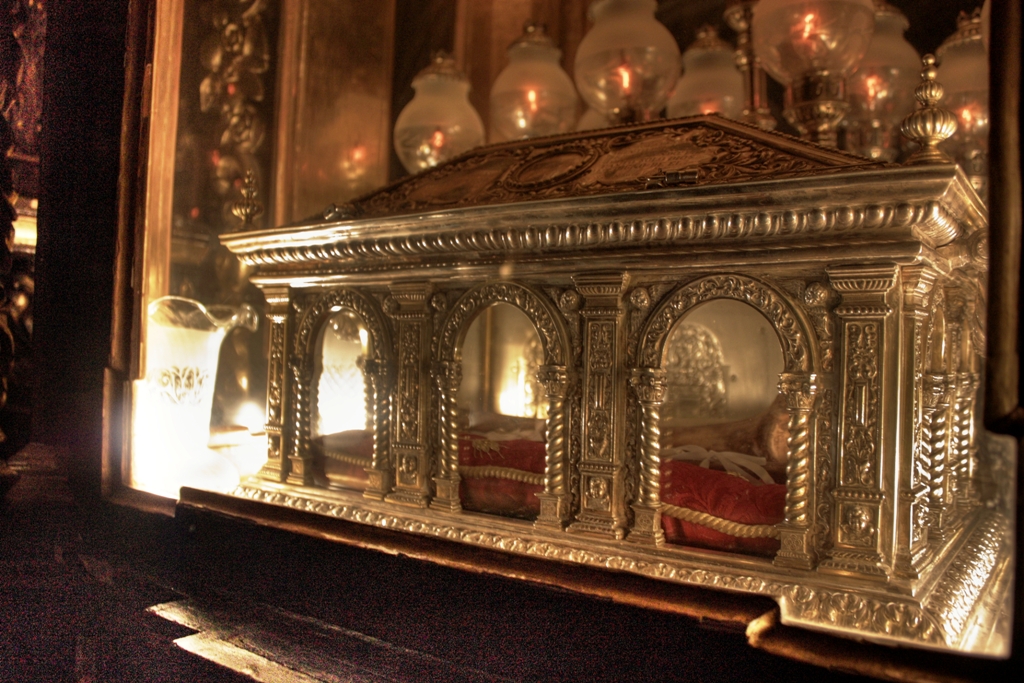
-reliquary of St John of the Cross, Ubeda, Spain
“Never give up prayer, and should you find dryness and difficulty, persevere in it for this very reason. God often desires to see what love your soul has, and love is not tried by ease and satisfaction.” – St. John of the Cross, “Special Counsels: Degrees of Perfection #9
“The Dark Night of the Soul”
-by St John Of the Cross
1. One dark night,
fired with love’s urgent longings
— ah, the sheer grace! —
I went out unseen,
my house being now all stilled.
2. In darkness, and secure,
by the secret ladder, disguised,
— ah, the sheer grace! —
in darkness and concealment,
my house being now all stilled.
3. On that glad night,
in secret, for no one saw me,
nor did I look at anything,
with no other light or guide
than the one that burned in my heart.
4. This guided me
more surely than the light of noon
to where he was awaiting me
— him I knew so well —
there in a place where no one appeared.
5. O guiding night!
O night more lovely than the dawn!
O night that has united
the Lover with his beloved,
transforming the beloved in her Lover.
6. Upon my flowering breast
which I kept wholly for him alone,
there he lay sleeping,
and I caressing him
there in a breeze from the fanning cedars.
7. When the breeze blew from the turret,
as I parted his hair,
it wounded my neck
with its gentle hand,
suspending all my senses.
8. I abandoned and forgot myself,
laying my face on my Beloved;
all things ceased; I went out from myself,
leaving my cares
forgotten among the lilies.
“The soul, however, cannot be perfectly purified from these imperfections, any more than from the others, until God shall have led it into the passive purgation of the dark night, of which I shall speak immediately. But it is expedient that the soul, so far as it can, should labor, on its own part, to purify and perfect itself, that it may merit from God to be taken under His divine care, and be healed from those imperfections which of itself it cannot remedy. For, after all the efforts of the soul, it cannot by any exertions of its own actively purify itself so as to be in the slightest degree fit for the divine union of perfection in the love of God, if God Himself does not take it into His own hands and purify it in the fire, dark to the soul.” — St. John of the Cross, p.14, Dark Night of the Soul, St Benedict Press Classics
“God does not fit in an occupied heart.”
— St. John of the Cross
“Though holy doctors have uncovered many mysteries and wonders, and devout souls have understood them in this earthly condition of ours, yet the greater part still remains to be unfolded by them, and even to be understood by them. We must dig deeply in Christ. He is like a rich mine with many pockets containing treasures: however deep we dig we will never find their end or their limit. Indeed, in every pocket new seams of fresh riches are discovered on all sides.”
-St John of the Cross
“The soul, however, cannot be perfectly purified from these imperfections, any more than from the others, until God shall have led it into the passive purgation of the dark night, of which I shall speak immediately. But it is expedient that the soul, so far as it can, should labor, on its own part, to purify and perfect itself, that it may merit from God to be taken under His divine care, and be healed from those imperfections which of itself it cannot remedy. For, after all the efforts of the soul, it cannot by any exertions of its own actively purify itself so as to be in the slightest degree fit for the divine union of perfection in the love of God, if God Himself does not take it into His own hands and purify it in the fire, dark to the soul.”
—St. John of the Cross, Dark Night of the Soul
“The reason why the soul not only travels securely when in obscurity, but also makes greater progress, is this: In general the soul makes greater progress in the spiritual life when it least thinks so, yea, when it rather imagines that it is losing everything …There is another reason also why the soul has traveled safely in this obscurity; it has suffered: for the way of suffering is safer, and also more profitable, than that of rejoicing and of action. In suffering God gives strength, but in action and in joy the soul does but show its own weakness and imperfections. And in suffering, the soul practices and acquires virtue, and becomes pure, wiser, and more cautious.”
—St. John of the Cross, Dark Night of the Soul
“If a man wishes to be sure of the road he treads on, he must close his eyes and walk in the dark.”
-St. John of the Cross
“Whenever anything disagreeable or displeasing happens to you, remember Christ crucified and be silent.”
-St. John of the Cross
“The strength of the soul consists in its faculties, passions and desires, all of which are governed by the will. Now when these faculties, passions and desires are directed by the will toward God, and turned away from all that is not God, then the strength of the soul is kept for God, and thus the soul is able to love God with all its strength.”
—St. John of the Cross, Ascent of Mt Carmel
“The freshness of a living hope in God fills the soul with such energy and resolution, with such aspirations after the things of eternal life, that all this world seems to it—as indeed it is—in comparison with that which it hopes for, dry, withered, dead, and worthless. The soul now denudes itself of the garments and trappings of the world, by setting the heart upon nothing that is in it, and hoping for nothing that is, or may be, in it, living only in the hope of everlasting life. And, therefore, when the heart is thus lifted up above the world, the world cannot touch it or lay hold of it, nor even see it. The soul then, thus disguised and clad in the vesture of hope, is secure from its second foe, the world, for St. Paul calls hope the helmet of salvation. Now a helmet is armor which protects and covers the whole head, and has no opening except in one place, where the eyes may look through. Hope is such a helmet, for it covers all the senses of the head of the soul in such a way that they cannot be lost in worldly things, and leaves no part of them exposed to the arrows of the world.”
—St. John of the Cross, Dark Night of the Soul
From the Proper for the Feast of St John of the Cross
Lord,
you endowed our Father Saint John of the Cross with a spirit of self-denial and a love of the cross. By following his example may we come to the eternal vision of Your glory.
Love,
Matthew

